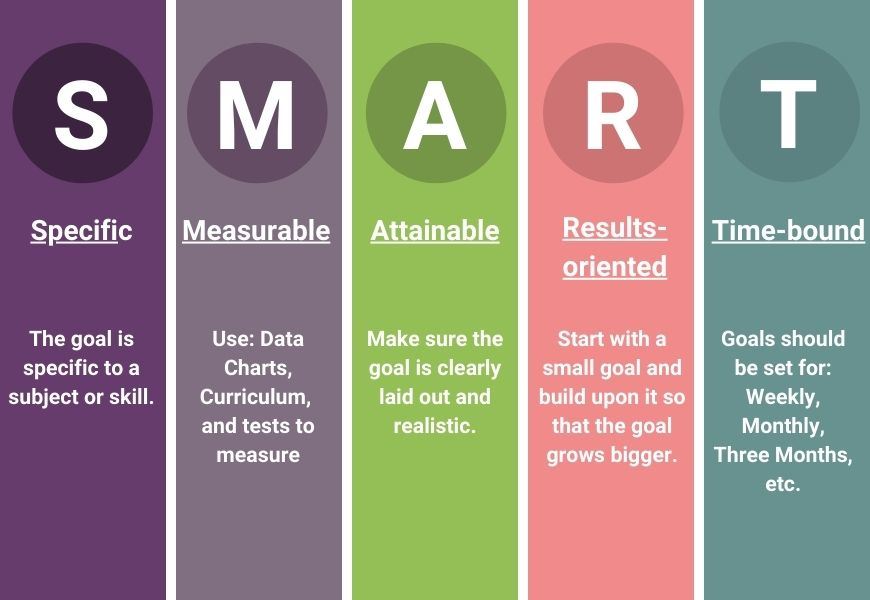
By Diana Parafiniuk, M.S., CCC-SLP, Co-Founder/Chief Marketing Officer
As a Special Education Teacher, it is mandatory to set appropriate goals on your Individualized Education Program (IEP for short) annually. Appropriately setting well thought out goals on the IEP allows students with any disability to achieve success, growth, and increase positive behaviors. By tracking progress accurately, you can make sure success is happening. Overall, we know that this can be a daunting task; you have to know the student’s baseline, make sure to understand how the student learns and processes new information, accurately progress and monitor the goals over time, and then determine if the student has mastered their goal. It takes a team to set these goals, including getting additional input from the parents, principal, therapists, school nurse, and support staff, for example. Each student’s IEP is unique and lays out the roadmap for their education journey, providing support, modifications, and accommodations that allow the student to achieve the most success possible in the school setting. Goal mastery changes year to year. IEP goals are vital to a student’s growth and success. Special Education students are mandated under their IEP to address goals specific to their disability needs, abilities, and behaviors. Your student’s road to success will be directed by your daily instruction based on your IEP goals. Here we lay out some thoughtful and helpful tips to move forward with drafting an IEP.
Use Parent Input When Possible
Before you draft your initial IEP goals for each student, it is imperative that you include a case history review or interview with the student’s parents. The parent plays one of the most vital roles in their child’s education, and understanding the parent’s concerns regarding their student’s needs, helps to set achievable goals for the future growth of their child. Providing opportunities for the parent to communicate to you, regarding their overall thoughts on the challenges their student’s are experiencing, will offer more information for you as a teacher. Parents are, by law, required to be an equal partner in their child’s IEP. Not only can they provide insight, but they can help collect valuable information along the way, as their student works on their IEP goals. We hope that each parent is an advocate for their child, wanting to attend parent meetings to discuss their child’s IEP throughout the school year, however, some parents might be unavailable to participate in the ways that we would like. Involved parents can help you better understand the student’s strengths, challenges, weaknesses, and overall learning style. Use the parents as a tool to set up an IEP that creates measurable and attainable goals. Parents can be key when developing successful IEP goals for that particular student.
Use SMART IEP Goals
The SMART acronym is short for Specific, Measurable, Attainable, Results-Oriented, and Time-Bound.  Provide goals that are very specific to a subject or skill. If these points are not considered, a goal will be easily failed, as it does not provide enough detail. Every goal should be measurable; start with a data chart, curriculum, or tests to help measure progress. Attainable is one of the most important goals since it can help increase independence in your students. It can also discourage students from completing them if the goal is not clearly laid out and realistic. Results-oriented can start small, so the student can easily meet their goal and build upon that as they progress. Finally, Time-bound, set these goals for the week, month, three months, and so on. Setting the endpoint gives the student a time frame and targets to achieve. It is also essential to make sure that your IEP is set to curriculum standards within your state.
Provide goals that are very specific to a subject or skill. If these points are not considered, a goal will be easily failed, as it does not provide enough detail. Every goal should be measurable; start with a data chart, curriculum, or tests to help measure progress. Attainable is one of the most important goals since it can help increase independence in your students. It can also discourage students from completing them if the goal is not clearly laid out and realistic. Results-oriented can start small, so the student can easily meet their goal and build upon that as they progress. Finally, Time-bound, set these goals for the week, month, three months, and so on. Setting the endpoint gives the student a time frame and targets to achieve. It is also essential to make sure that your IEP is set to curriculum standards within your state.
Use Resources to Help Plan
In addition to setting appropriate goals for your student’s IEP, it is important to help use resources to guide your process. State Standards and regulations may change, so not only are you responsible for knowing what the student needs, you are responsible for implementing these standards into each IEP goal. Take the extra step by setting up a resource binder (or an online file folder) filled with articles, a goal bank to build from, lesson plans, state standards, and more. References and tools will help guide you to better manage your classroom and communication with your student, their parents, and appropriate administration. Here is a list of our trusted resources that can help you when planning.
- A Guide to the Individualized Education Program
- The IEP Process Explained
- Understanding the 13 Categories of Special Education
- Wrightslaw: information about special education law and advocacy for children with disabilities
These are just a few resources and ideas to help get you started and guide you on creating successful individualized IEP goals for your students. Creating and cultivating relationships with your students and parents play a vital role in the educational progress of each student. The best piece of advice is to keep up with state standards and regulations for your school district. Please visit our E-Therapy Empower Blog. To speak with our E-Therapy directly, call us at (800)330-0093.
